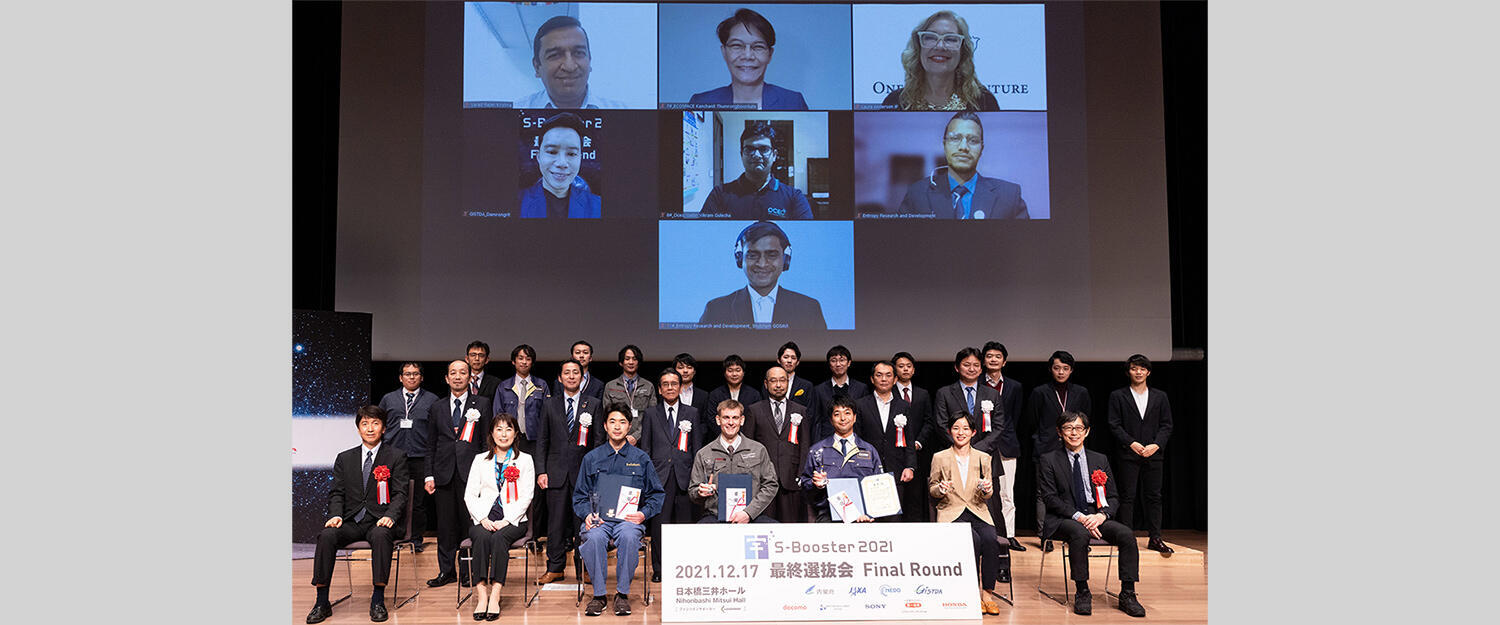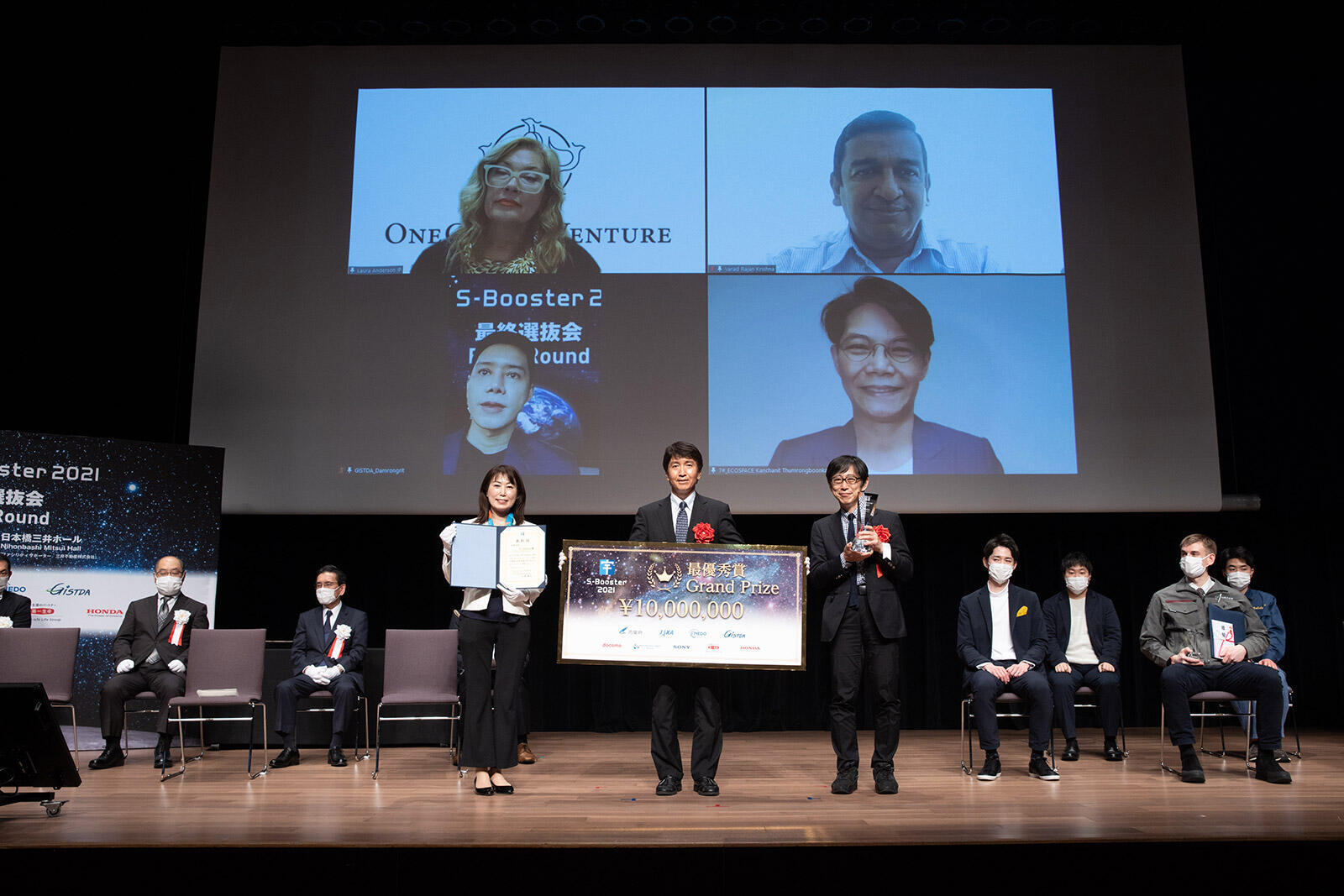
Business Development and Industrial Relations Department

S-Booster 2021
Contest for New Business Ideas Utilizing Space Assets
S-Booster 2021 - Dominated by ideas to solve social issues
JAXA co-hosts "S-Booster" (Host: Cabinet Office of Japan), which is a contest for new space business ideas launched in 2017 to search for, examine and support a range of ideas for the promotion of the space industry including startups in the field. It was held for the first time in two years, as the event was cancelled in fiscal 2020 due to COVID-19.
"Through this contest, in which companies and individuals can participate from a wide range of industries, not limited to the space industry, we search for new ideas utilizing space assets and give support to the commercialization of the ideas. For S-Booster 2021, there were about 140 entries from within Japan and as many as about 60 entries in total from 11 countries in Asia and Oceania," says SHIMAZKI Kazunori, Business Development and Industrial Relations Department.
The Department engages in the contest in a neutral position as a member of the steering committee and also conducts PR activities for the event. Moreover, capitalizing on JAXA's unique knowledge, the Department gives technical advice to judges upon request from them. About the screening criteria for "S-Booster," SHIMAZAKI says as follows:
"Because it is a contest for business ideas, the criteria include profitability as a business, as well as innovativeness, novelty, contribution to the solution of social issues, and sustainability as a business."
The S-Booster screening process is composed of Round 1 (document screening), Round 2 (presentation), Mentoring, and the Final Round, in which 12 finalist teams each make a presentation and the winners of the Grand Prize, Special Judges' Prize, Sponsor Prize, and JAXA Prize are selected from the teams.
For S-Booster 2021, the Grand Prize was awarded to the EcoSpace team from Thailand. The team proposed a system to promptly detect and warn against wildfires by the use of IoT satellite communication in the areas where the Internet service is unavailable, such as in forests.
"In Asia and Oceania, wildfires are becoming a serious social problem. The proposed idea includes the establishment of a base station for satellite communication in an area where Internet communication is not widely available for the early detection of wildfires and will help solve the social issue."

In addition to the idea proposed by EcoSpace, many other ideas were proposed for the solution of social issues. For example, the Star Signal Solutions team from JAXA proposed an idea for more precise monitoring of space debris, which is becoming a global problem, and won the Special Judges'Prize.
About this idea, SHIMAZAKI says as follows: "The technology to make use of star trackers mounted on satellites for the monitoring of the space environment can be put into practical use at low cost. It will help avoid satellite collisions for higher space safety. Moreover, setting aside the fact that I am also a staff member of the Agency, I think it is interesting that the team from JAXA proposed the use of already available things for the solution of the problem."
Solid Knitting Machine--A 3D knitting printer wins the JAXA Prize
From among the 12 finalist teams, the JAXA Prize was awarded to the Japanese Solidknit team for its "Solid Knitting Machine: A Novel 3D Printing Technique Which Makes Physical Objects Updatable."
Regarding this idea, SHIMAZAKI says, "The solid knitting machine can make 3D items such as chairs and beds out of yarn. If this machine and yarn are brought to the moon, various things can be knitted there. Moreover, you can "update" a chair knitted by the machine by unwinding the chair and reknitting it into a desk. The machine, which can knit yarn into various shapes, will contribute to reducing the transportation cost for space activities and also give a great merit in terms of recyclability."
"The idea was developed from a viewpoint that JAXA personnel do not have and has a future potential and affinity with space exploration activities, I think. We would like to support the team in turning the idea into a reality in one way or another."

One of the features of "S-Booster" is that it provides the possibility for commercialization. For example, Tenchijin, Inc. team, which participated in S-Booster 2018 on the theme, "Discovering Famous Production Sites from Space" later formed a space start-up, which is mainly composed of JAXA personnel and developers versed in the agriculture-related IoT field. The start-up is pressing forward with the project proposed by the team by making combined use of the data obtained from multiple satellites and the ground data to identify the agricultural plant that is optimal for growth in each area, thereby finding more value for the local land."
"Needless to say, feasibility is important, but if your idea attracts the attention of investors, they might help you take the first step toward the commercialization of the idea. Furthermore, students can also participate in the contest, and we accept entries from industries that have currently nothing to do with space so far as their ideas meet the necessary criteria. You can submit your entry to the contest so far as you have an idea to propose, which is a good point of S-Booster."
Also, "The mentoring stage included in the screening process gives a merit to participants," says SHIMAZAKI and he continues as follows:
"Those who have passed Round 2 in the contest will be given an opportunity to be instructed by mentors to brush up their ideas. Many of those who received the instructions appreciate the mentoring stage as a great opportunity to receive advice from experts and listen to tips for commercialization. Also, some were pleased at the encounters with the mentors. Now, there are much more investors who are finding potential in space than in the past, and I expect all those who want to embrace a space-related challenge to participate in the contest."
S-Booster thus fosters the creation of unprecedentedly new ideas, which are expected to be commercialized to contribute to further development of space business.
Profile

|
|
|---|
All the images are copyrighted ©JAXA unless otherwise noticed.
- Home>
- Global Activity>
- Public Relations>
- JAXA’s>
- JAXA's No.87>
- S-Booster 2021 - Contest for New Business Ideas Utilizing Space Assets